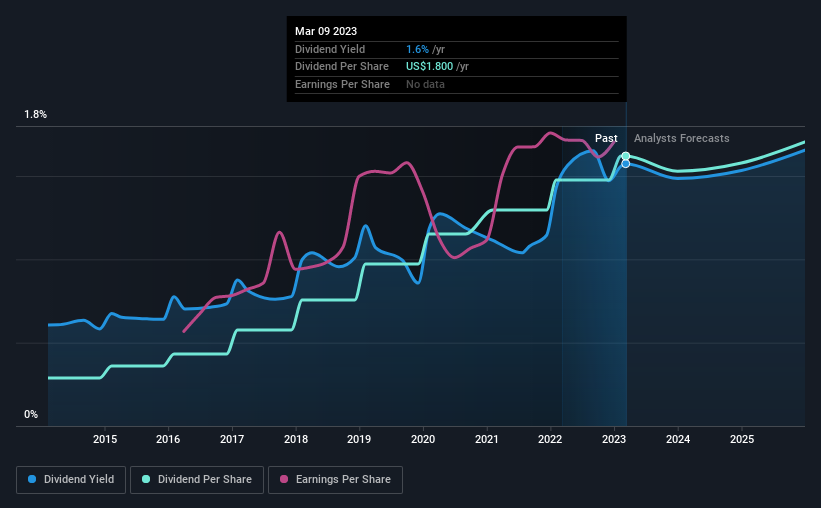Should You Buy Allegion plc (NYSE:ALLE) For Its Upcoming Dividend?
It looks like Allegion plc (NYSE:ALLE) is about to go ex-dividend in the next 4 days. The ex-dividend date is usually set to be one business day before the record date which is the cut-off date on which you must be present on the company's books as a shareholder in order to receive the dividend. The ex-dividend date is of consequence because whenever a stock is bought or sold, the trade takes at least two business day to settle. Meaning, you will need to purchase Allegion's shares before the 14th of March to receive the dividend, which will be paid on the 31st of March.
The company's next dividend payment will be US$0.45 per share, and in the last 12 months, the company paid a total of US$1.64 per share. Looking at the last 12 months of distributions, Allegion has a trailing yield of approximately 1.6% on its current stock price of $114.35. If you buy this business for its dividend, you should have an idea of whether Allegion's dividend is reliable and sustainable. We need to see whether the dividend is covered by earnings and if it's growing.
Check out our latest analysis for Allegion
Dividends are typically paid out of company income, so if a company pays out more than it earned, its dividend is usually at a higher risk of being cut. Allegion paid out a comfortable 32% of its profit last year. A useful secondary check can be to evaluate whether Allegion generated enough free cash flow to afford its dividend. Thankfully its dividend payments took up just 36% of the free cash flow it generated, which is a comfortable payout ratio.
It's encouraging to see that the dividend is covered by both profit and cash flow. This generally suggests the dividend is sustainable, as long as earnings don't drop precipitously.
Click here to see the company's payout ratio, plus analyst estimates of its future dividends.
Have Earnings And Dividends Been Growing?
Businesses with strong growth prospects usually make the best dividend payers, because it's easier to grow dividends when earnings per share are improving. Investors love dividends, so if earnings fall and the dividend is reduced, expect a stock to be sold off heavily at the same time. For this reason, we're glad to see Allegion's earnings per share have risen 13% per annum over the last five years. The company has managed to grow earnings at a rapid rate, while reinvesting most of the profits within the business. This will make it easier to fund future growth efforts and we think this is an attractive combination - plus the dividend can always be increased later.
Another key way to measure a company's dividend prospects is by measuring its historical rate of dividend growth. Allegion has delivered an average of 21% per year annual increase in its dividend, based on the past nine years of dividend payments. It's great to see earnings per share growing rapidly over several years, and dividends per share growing right along with it.
To Sum It Up
From a dividend perspective, should investors buy or avoid Allegion? We love that Allegion is growing earnings per share while simultaneously paying out a low percentage of both its earnings and cash flow. These characteristics suggest the company is reinvesting in growing its business, while the conservative payout ratio also implies a reduced risk of the dividend being cut in the future. Allegion looks solid on this analysis overall, and we'd definitely consider investigating it more closely.
While it's tempting to invest in Allegion for the dividends alone, you should always be mindful of the risks involved. Every company has risks, and we've spotted 2 warning signs for Allegion you should know about.
A common investing mistake is buying the first interesting stock you see. Here you can find a full list of high-yield dividend stocks.
Have feedback on this article? Concerned about the content? Get in touch with us directly. Alternatively, email editorial-team (at) simplywallst.com.
This article by Simply Wall St is general in nature. We provide commentary based on historical data and analyst forecasts only using an unbiased methodology and our articles are not intended to be financial advice. It does not constitute a recommendation to buy or sell any stock, and does not take account of your objectives, or your financial situation. We aim to bring you long-term focused analysis driven by fundamental data. Note that our analysis may not factor in the latest price-sensitive company announcements or qualitative material. Simply Wall St has no position in any stocks mentioned.
Join A Paid User Research Session
You’ll receive a US$30 Amazon Gift card for 1 hour of your time while helping us build better investing tools for the individual investors like yourself. Sign up here

